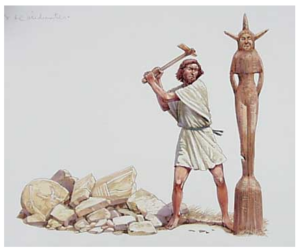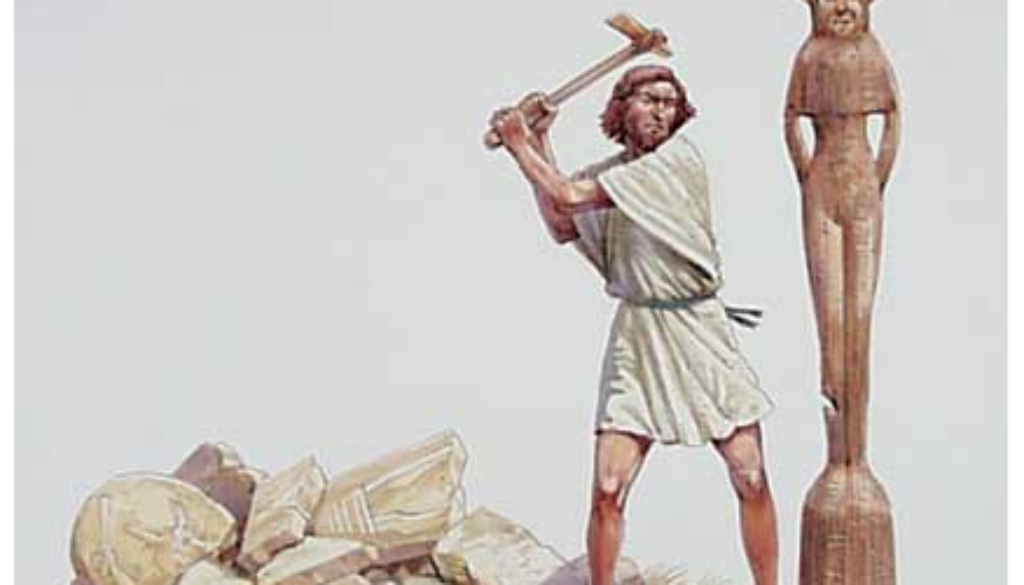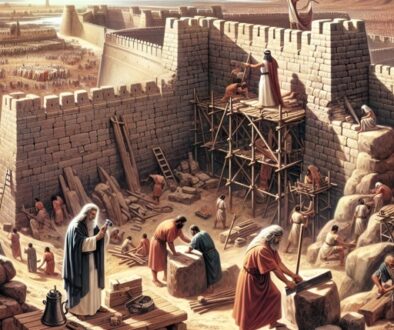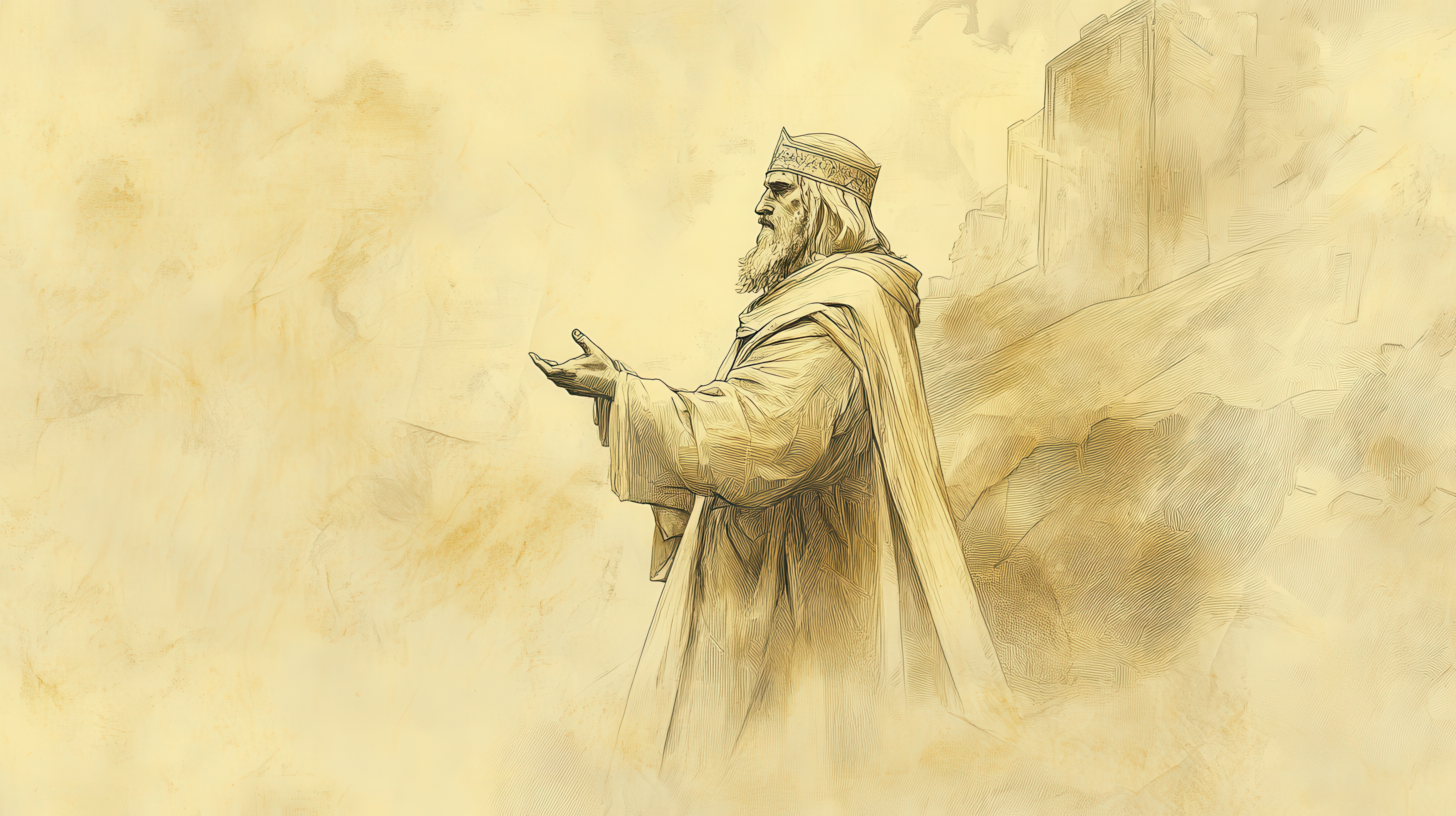1 Kings 15 Asa

King Abijam is dies and his son, Asa, takes the throne. Jeroboam is still king over Israel. Asa starts out strong for the Lord, but doubts later on and ends badly.
Asa is on fire for the Lord. He rids Judah of all their false gods and altars. He even kicks his own mother out of the position of queen mother because she makes an Asherah. He stands against mighty armies in the name of the Lord. Then, when King Baasha tries to prevent people from coming to Judah, he turns to man for help.
Because we have two independent accounts, I am unclear on a few points. We are told that King Asa had rest for at least one ten-year period. I’m unclear if it came right after taking the throne or after his war with the Ethiopians.
We know that King Baasha fought with Asa at least once. In 1 Kings, we don’t have a timeline for that encounter but it is recorded. In 2 Chronicles 16:1, we are told that Baasha and Asa clashed in Asa’s 36th year of reign. According to the timeline in 1 Kings 15-16, this is not possible. During Asa’s 36th year of reign, Omri was king of Israel.
We are told that “there was war between Asa and Baasha king of Israel all their days” (1 Kings 15:16). I don’t know if there was early war or possibly war after the one we know of.
First Kings does not tell us if there was war with Asa from Jeroboam or Nadab (Jeroboam’s son). But because of Asa’s sin, in 2 Chronicles 16:9, God tells him that he will have wars from his big encounter with Baasha onward. So, we can assume that there was war with Elah and Omri. Zimri’s reign was too short for any fighting with Judah.
Because of the timeline issue, I’m going to ‘assume’ that 2 Chronicles 15:19 and 2 Chronicles 16:1 truly means 25th and 26th years instead of 35th and 36th. Let’s walk with King Asa through his ups and downs, as the Spirit leads us today.
♥ ♦ ♥
Newly minted King Asa stands over the people as they honor his father, Abijam. Asa learned a lot from him as he grew up, and the most important lesson he learned is that God is NOT happy with the way things have been going in Judah. Asa’s heart is tender towards the Lord and he is NOT happy with what he sees either. He is finally in a position to change this.
As soon as the days of mourning are complete, Asa calls his scribe. “Take this down. ‘To all the inhabitants of Judah, put away your idols! It is time to return to the God of our fathers. In ALL the land of Judah, there will no longer be any male cult prostitutes, Asherim poles, or high places to other gods. Do this now, or I will have it done as you look on.’”
When the message is ready, including several copies, Asa calls for the captain of his guards.
“Deliver this message to every city, town, and gathering throughout Judah. Make sure that everyone hears and sees this message.”
“It will be done as you command my king” replies the captain of his guards.
Asa’s message goes out that very day. Many who hear it immediately respond to his edict. Others choose not to listen. They hold fast to their idols. Some are hidden, but others are left out on full display, thumbing their noses at the king’s command.
Asa allows the people two months to rid their homes and towns of the detestable items. One of those people is his own mother. She made an Asherah of her own. As queen mother, she felt exempt from this decree.
On the first day of the third month of Asa’s reign, he turns his attention to cleaning Judah. And he starts in his own home.
“Ima, I know that you heard my edict. Why did you not put away or destroy this ‘thing’”, Asa says as he points to the idol she has erected.
“I need my gods. Surely you would not deny your own mother of her gods!”
“I most certainly will. Not only am I taking this ‘thing’ but you no longer have a place beside me as queen mother. Me and my house will serve the Lord. And so will the people of Judah.”
Maacah watches as her Asherah is taken from its place. Asa himself wields the axe that struck it down. It is carried to the brook Kidron where Asa sets fire to it and watches it burn. Maacah cries out for mercy but Asa gives her none. “This HAS to be done Ima. Judah MUST return to the Lord with all her heart. If we have any hope of Him blessing us, we must first honor Him and His commandments. The FIRST of which is to place Him above ALL else.”
Asa leaves his mother weeping beside the burning ash pile as her god is devoured by fire. This is Asa’s first of MANY encounters with this same result. Asa personally goes through the cities and towns, searching out every idol, altar, Asherah, and high place. They are ALL broken down and burned in the fire. There will be no resurrecting these idols when Asa’s back is turned.
Much of the land rejoices as Asa makes his way through even the cities that were taken by Abijam. Nowhere was exempt from this purging and turning to the Lord.
Within days, the people could see the beginnings of the blessings of the Lord returning to the land. This strengthened their desire and commitment to follow the commands of their king. Rain fell in its due season. The fields yielded crops in abundance. The children were healthier and in more abundance.
Judah also enjoyed victory in battle. Whether it be Jeroboam, Nadab or Baasha leading Israel, Asa’s men easily put down the encroachments onto their territory. And because the blessings of the Lord were so obvious, people from Ephraim, Manasseh, and Simeon began flocking into Judah by the hundreds. They too wanted to serve the Lord.
In the fifteenth year of Asa’s reign, another people decided to try their hand at conquering the land. Zerah the Ethiopian came out against Judah with a million men and 300 chariots. They made inroads into Judah’s territory before they came up against Asa and his forces. Asa had 300,000 men from Judah and 280,000 men from Benjamin who could draw a bow. Far less numbers. Zerah considered the battle all but over when the two forces met in the Valley of Zephathah at Mareshah.
Asa didn’t look with his natural eyes and see the same thing Zerah did. Asa saw an opportunity for the Lord to show his hand to the nations around them. Asa went straight to the Lord.
“O Lord, there is none like You to help, between the mighty and the weak. Help us, O Lord our God, for we rely on You, and in Your name we have come against this multitude. O Lord, You are our God; let not man prevail against You” (2 Chronicles 14:11).
Asa prayed his prayer loud enough for his men to hear, and Zerah if he wanted to. The men of Judah were charged by the prayer of Asa and they let out a battle cry that shook the hills. The Levites blew the trumpets and the men rushed headlong into battle.
Chariot wheels came off, the enemy’s men tripped on one another, and chaos reigned supreme in the camp of Ethiopia. And Judah’s men capitalized on every opportunity. Swords clanged, shields crashed, arrows flew, and men fell; Ethiopian men at least.
Judah pressed on as the Ethiopian army fled before them. Judah pursued the invading army as far as Gerar. Not a one of them survived. Judah attacked Gerar and all the cities around it. Even the tents of those tending flocks fell under Judah’s hand. The Lord showed Himself faithful throughout!
After the fighting ended, Judah began to collect the spoils. There was an overwhelming abundance gathered and brought back to Jerusalem. Asa’s men came back to Jerusalem singing the praises of the Lord for all that He had done and provided.
As the men of Judah are on their way home, the Lord speaks to Azariah the prophet. The Lord has a message he wants brought to Asa. Asa is still outside the gates of Jerusalem when Azariah meets him.
Asa sees Azariah hurrying towards him and recognizes him immediately. Holding up a hand for his men to halt, Asa waits for Azariah to speak.
“Hear me, Asa, and all Judah and Benjamin: The Lord is with you while you are with him. If you seek him, he will be found by you, but if you forsake him, he will forsake you. For a long time Israel was without the true God, and without a teaching priest and without law, but when in their distress they turned to the Lord, the God of Israel, and sought him, he was found by them. In those times there was no peace to him who went out or to him who came in, for great disturbances afflicted all the inhabitants of the lands. They were broken in pieces. Nation was crushed by nation and city by city, for God troubled them with every sort of distress. But you, take courage! Do not let your hands be weak, for your work shall be rewarded” (2 Chronicles 15:2-7).
A cheer goes up from the men at the end of the words of Azariah. Asa and all his men KNOW that the Lord was surely with them this day, and they want MORE of His favor. The men continue on into the city. Asa calls for his scribe as soon as he is within the gates.
“Take a message and have it delivered to every city, town, village, and home in Judah, including the cities in Ephraim that have been reclaimed for the Lord. ‘The people of Judah and all within her protection are to assemble in Jerusalem on the sixth day of the third month of the fifteenth year of the reign of Asa. There will be a holy convocation to the Lord.’”
The message is quickly copied and dispatched. The date chosen is two weeks away. Riders will have to be swift to allow the people time to travel to Jerusalem.
Not a home was missed when carrying Asa’s message. Asa picked this day as it begins the Festival of Weeks. This is a most appropriate day, as it celebrates the giving of the Ten Commandments to the people of the Lord.
Men, women, and children begin flocking to Jerusalem. They are anxious to hear the king’s message as well as observe the festival of Shavuot. Jerusalem is teaming with people by the morning of the 6th.
Asa rises early on the appointed day and carefully performs all the cleansing rituals. He must be holy before the Lord. He is at the Temple when the morning sacrifice is made. He does this often, but today it holds even more importance to him. This day he will formally call the people back to the Lord.
Asa had reserved 700 oxen and 7,000 sheep from the spoils for Judah’s battle with Ethiopia. These have been set aside for this very day. They will be sacrificed to the Lord. These would be offered in addition to the traditional offerings and given to the people to eat together as a fellowship offering.
All the people gather at the Temple. As many as can, push into the courtyard. Those who can’t, remain as close as possible as the celebration begins. Asa watches from Solomon’s portico as the burnt offering and the sin offerings are placed upon the altar. He breathes a sigh of relief as he feels his own heart lighten as the sin offering is consumed by the flames.
“To You O Lord, do I commit my life and the lives of all those You have placed under my hand”, he vows silently to the Lord. Once the peace offering and the wave offering are complete, Asa signals to his guards to begin bringing in the reserved spoils for the fellowship offering.
Solomon had made the center of the Courtyard holy so that large offerings could be offered there, as they did not fit on the altar. Asa allows this to take place today as well, as there are so many sheep and oxen being offered.
As the meat is roasting on the fires, Asa calls all of Judah to attention. “This day is a special day unto the Lord. Not only is it celebrating the day the Law was given to our fathers, but it is the day that we, as a people, commit ourselves FULLY to following the Lord. He has spoken to us saying; ‘The Lord is with you while you are with him. If you seek him, he will be found by you, but if you forsake him, he will forsake you.’ And we WILL seek him as a nation! I commit to you to lead you in the ways of the Lord and to serve Him all my days. And I, as your king, command you to follow His statutes and laws.”
The people cry out; “We will serve him with our whole hearts!”
“Moreover, any who do NOT serve the Lord will be put to death. Search your hearts people. Choose the Lord and live! He will surely bless those who bless Him and love those who love Him.”
The day was joyous and all of Judah committed again to serving the Lord. Trumpets blew, people sang praises, and food and wine flowed throughout the city; even to those who could not get in through the gates were included in the festivities.
The following day, Asa sent his troops again to search out any idols that had been hidden during their earlier search. Any that were found were immediately destroyed and their owner’s taken captive.
The land had rest for ten years. There was no war, even between Israel and Judah. As the years passed though, more people left Israel and sought to live in Judah where they could worship the Lord in spirit and in truth. And they strengthened their walls and fortified their cities; repairing all that had been broken.
King Baasha of Israel kept an eye on this process. He was NOT happy with the number of people flooding into Judah. Every soul who slips into Judah is one less he has for himself in Israel.
“I HAVE to put a stop to this!” Baasha paces his room while thinking. “If I can block the roads into Jerusalem, maybe I’ll keep what is left from deserting me.”
To this end, Baasha begins work in Ramah. He is building siege works to prevent anyone from going from Israel to Judah.
Asa learns of Baasha’s actions and is worried. “He is trying to cut us off from the rest of the world. This is just his first step in hemming us in” thinks Asa. “I have to find a way to stop him.”
Asa wracks his brains and comes up with an answer. Ben-hadad of Syria is that answer. There had been good relations with Abijam and even himself and Ben-hadad. Asa also knows that Ben-hadad also has an alliance with Baasha. Asa he needs to get Ben-hadad on HIS side. He prepares him a message. “If Baasha is busy fighting Ben-hadad, he won’t have time to finish his blockades.”
Asa prepares a messenger with gold and silver from the treasuries of the Lord and his own house. He sends his message along with his message, carefully penned so as to appeal to their friendship.
Asa’s messenger reaches Ben-hadad within days and is ushered into his throne room. “I come with a message from King Asa” he announces.
“Read it” instructs Ben-hadad.
“The words of King Asa of Judah to Ben-hadad of Syria are as follows: ‘There is a covenant between me and you, as there was between my father and your father. Behold, I am sending to you silver and gold. Go, break your covenant with Baasha king of Israel, that he may withdraw from me’ (2 Chronicles 16:3).”
Ben-hadad is pleased with the gifts Asa has sent him. He also wonders at the plunder he could gain by attacking Israel. Baasha has sent him nothing for far too long for his liking. “I’ll do it” he says whole pounding his fist on the arm of his throne.
Within a week, Ben-hadad is attacking Israel. He “conquered Ijon, Dan, Abel-maim, and all the store cities of Naphtali” (2 Chronicles 16:4b). Baasha heard about the attacks and quickly abandoned his building up of Ramah. He turned his attention instead to defending Israel against the forces of Syria.
Asa has spies watching Ramah and Baasha’s progress. They can scarce believe their eyes as they see Baasha and all his troops marching out of Ramah.
“What’s going on? Is he withdrawing?”
“It looks that way, but I wonder why.”
“Whatever his reason, we need to inform the king.”
“I’ll wait here. You go and inform the king. Bring me word as to what he wants of us.”
The message is relayed to Asa withing the hour and Asa begins calling all of Judah. “You are to each carry away the stones King Baasha was using to build up Ramah. Leave no stone for him to return to. None are exempt from this task, and it must be done in haste.”
Within days, the stones are dragged from Ramah and the battlements taken down. As the pieces are being dragged from Ramah, the Lord speaks to Hanani the seer. He has a message for Asa.
Hanani comes to Asa’s throne room and stands before him. “Because you relied on the king of Syria, and did not rely on the Lord your God, the army of the king of Syria has escaped you. Were not the Ethiopians and the Libyans a huge army with very many chariots and horsemen? Yet because you relied on the Lord, he gave them into your hand. For the eyes of the Lord run to and fro throughout the whole earth, to give strong support to those whose heart is blameless toward him. You have done foolishly in this, for from now on you will have wars” (2 Chronicles 16:7-9).
Asa was initially excited to see Hanani. He knows of Hanani’s role and expected to receive another message similar to that which Azariah delivered years ago. His face falls as Hanani begins his message. By the end of the Lord’s message, Asa is furious. He calls out to the guard at the door.
“Seize him and throw him in the stocks!”
Hanani spends the next seven days in the stocks but will not repent of the message the Lord had him deliver. Asa has him released but forbids him from seeing his face again.
From that day onwards, Asa refuses to seek the Lord for any reason. He is angry at God. And now, he is busy facing enemies on every front.
Years of this anger go by without it decreasing. In his 39th year of reign, Asa develops a disease in his feet. It begins small, with sores developing on his heels and the sides of his big toes. Those sores spread to the balls of his feet and within two years, Asa’s feet are literally rotting off his ankles. During all this, Asa refuses to seek help from the Lord. He calls for the physicians but refuses even their advice to repent of his sins and seek the Lord.
Asa finally dies of this infection. Instead of being buried with David and all the kings who proceeded him, Asa has a special tomb cut out for himself. This is where he is laid to rest.
(to be continued)
There is such a contrast between Asa and David when confronted by their sins. David immediately repents. Asa becomes angry. Both received consequences for their sins, but Asa’s refusal to repent lengthened his to the rest of his life. I wonder how his life would have turned out if he had repented.
This reminds me to be QUICK to repent, and sincere in changing my behavior. God listens when we repent. And He FORGIVES.
Father God, THANK YOU for Your forgiveness! I need it more and more all the time. I pray that I am quick to hear when Your Spirit convicts my heart. I want NOTHING to separate me from You.




